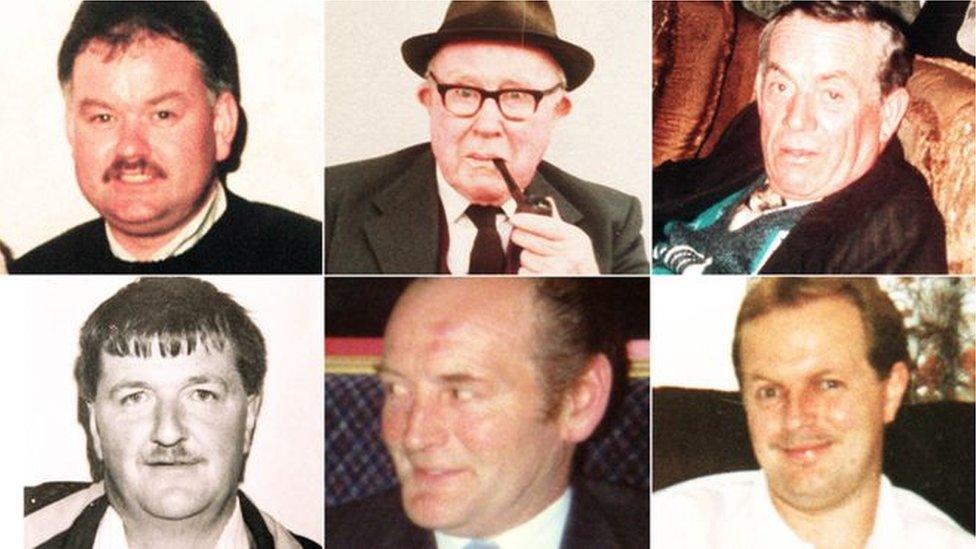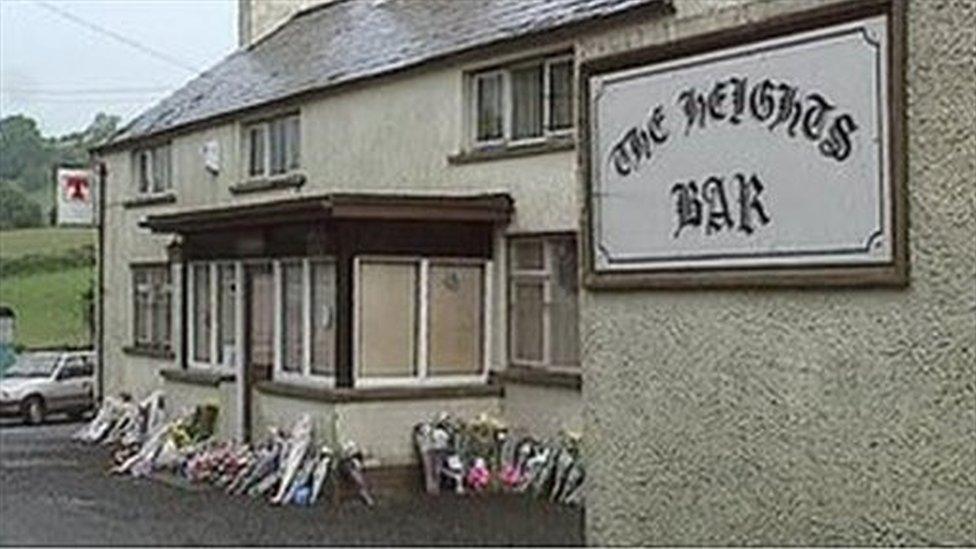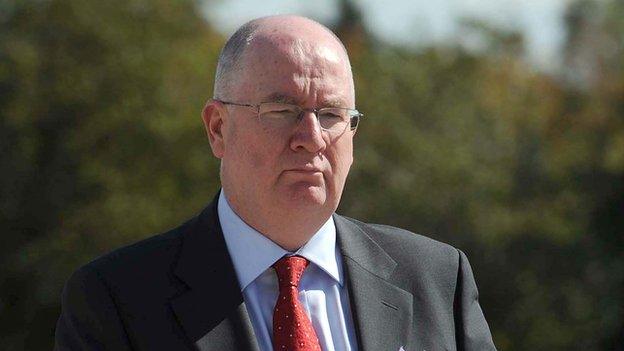Loughinisland murders: Families 'relieved' that report will stand
- Published

Six men were shot dead as they watched a football match in a pub in Loughinisland in 1994
Families of the Loughinisland victims have voiced their relief after a court said it would not quash a police ombudsman's report relating to the attack.
Judges ruled the ombudsman "overstepped the mark" by accusing police of criminal offences.
But they refused a bid by two retired policemen to quash the watchdog's public statement on the 1994 attack.
Six Catholic men were killed in the attack on a village pub in June 1994.
They were watching the Irish football team play in the World Cup match when the pub was targeted by Ulster Volunteer Force gunmen.
The victims' families have alleged corrupt links between police and the killers.
They asked the police ombudsman to look into their concerns over the police investigation which was carried out by the Royal Ulster Constabulary (RUC).
The ombudsman publicly criticised the RUC investigation, but two retired police officers subsequently took legal action over his findings.
In a Court of Appeal ruling published on Thursday - the 26th anniversary of the killings - the judges accepted the ombudsman was right to acknowledge what he had uncovered was in line with the families' views.
In a statement, the victims' families said they were relieved by the "clear decision" not to quash the report.
Emma Rogan, daughter of victim Adrian Rogan, said that families could now remember their loved ones with the "dignity and respect they deserve".
Ulster Unionist MLA Alan Chambers said it was "highly significant" that the court ruled the ombudsman had "overstepped the mark" by attempting to connect RUC officers to criminal offences.
Mr Chambers said the focus should be very firmly on the terrorists behind the attack.
In Thursday's ruling, Lord Chief Justice Sir Declan Morgan identified three sections in the disputed report where the ombudsman went beyond his powers in reaching emphatic conclusions.
"The determinations he made in the three offending paragraphs... overstepped the mark by amounting to findings of criminal offences by members of the police force," Sir Declan said.

The attack took place on 18 June 1994 at the Heights Bar in Loughinisland
The men shot dead were: Adrian Rogan, 34, Malcolm Jenkinson, 53, Barney Green, 87, Daniel McCreanor 59, Patrick O'Hare, 35, and Eamon Byrne, 39.
No-one has ever been brought to justice for the sectarian attack.
'Catastrophic failings'
In June 2016, the then Ombudsman, Dr Michael Maguire, said collusion between some RUC officers and the loyalist paramilitaries "was a significant feature of the Loughinisland murders".
The ombudsman found no evidence police had prior knowledge of the attack, but identified "catastrophic failings" in the investigation.

Michael Maguire served as Police Ombudsman for seven years from 2012 to 2019
Raymond White, representing the Northern Ireland Retired Police Officers' Association, and Ronald Hawthorne, a former sub-divisional police commander, have been involved in a long-running legal challenge to the published findings.
A first hearing resulted in a ruling in 2017 that the report was procedurally unfair and had failed to make clear it conclusions did not apply to Mr Hawthorne.
At that time the watchdog agreed to remove any references to him to ensure he is not connected to any alleged wrongdoing - a move seen as complete vindication for the former police commander.
A limited re-hearing before a different judge focused only on issues around the extent of the powers to publish the findings.
In November 2018, a High Court judge rejected the retired officers' case that Dr Maguire had exceeded his legal remit and refused to quash the report.
Mr White and Mr Hawthorne mounted an appeal against that ruling.
'Barbarous attack'
Ruling on the appeal, Sir Declan acknowledged the anniversary of the Loughinisland killings, as well as the loss and hurt suffered due to the "barbarous attack".
"Compared to that, this judgment is relatively unimportant, but I hope it will provide a basis for all to understand what victims and police can expect from the proper conduct of complaints by the Ombudsman pursuant to the Police (Northern Ireland) Act 1998," he said.
The Lord Chief Justice set out how the dispute centred on comments in a summary chapter of the report.
He confirmed: "We consider that the emphatic conclusions reached by the ombudsman in the three offending paragraphs go beyond mere modes of expression and exceed his powers.
"We do, nevertheless, uphold the decision of the judge at first instance not to strike down the public statement because of what was written therein."
A spokesman for the Police Ombudsman's office said it was "considering the judgement".
- Published9 August 2019

- Published29 November 2018
